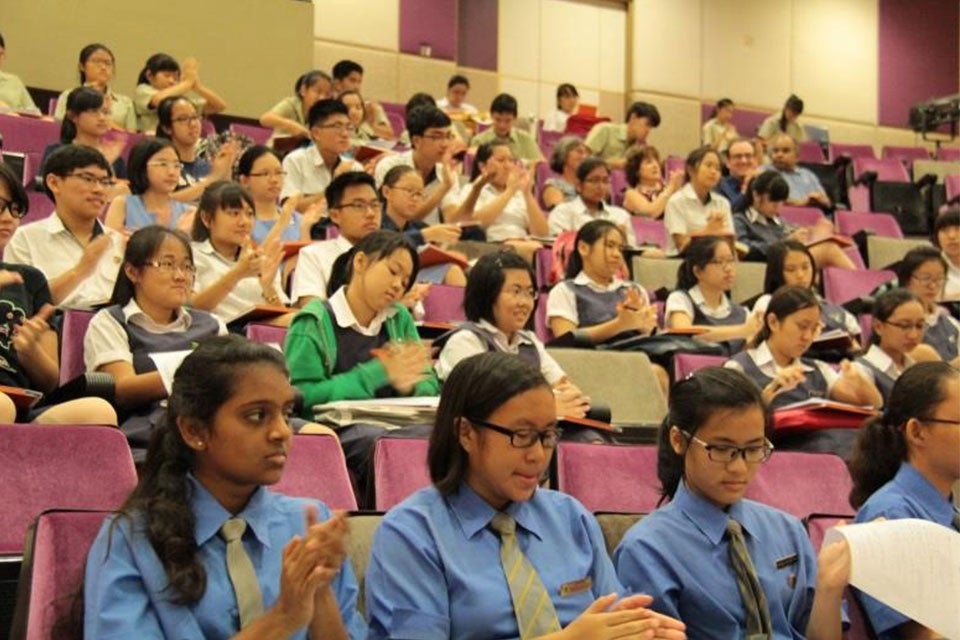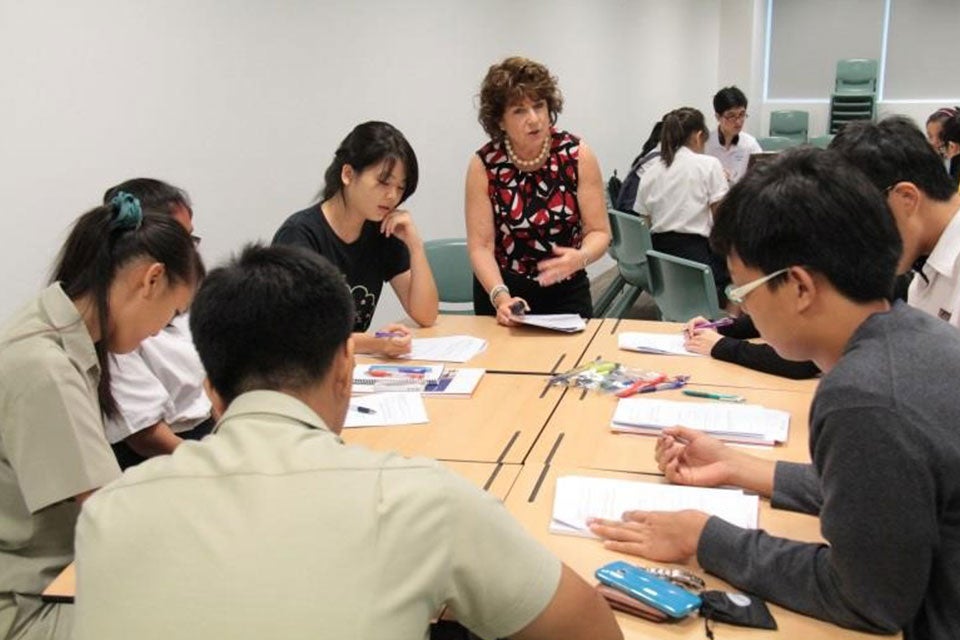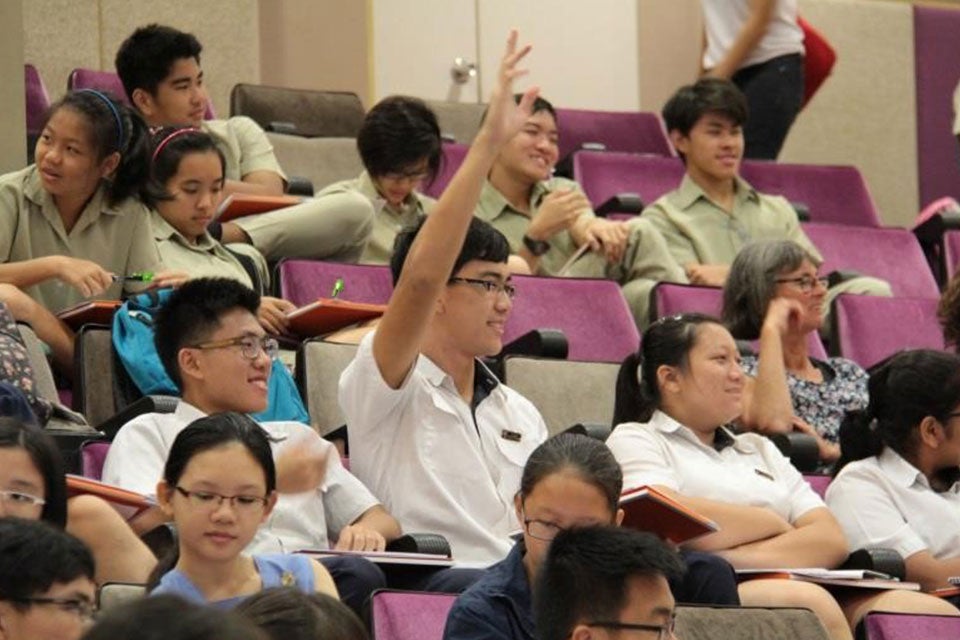Future Perfect Student Symposium
Published: 06 May 2014
On the 17 and 18 March 2014, 150 students and teachers from seven secondary schools, junior colleges and polytechnics gathered for a bioethics symposium and were engaged in plenary and group discussions on questions such as “What are the promises and perils of human enhancement technologies (HETs)?” and “Should we embrace HETs?”
No doubt the advances in science and medicine have led to the development of new technologies and practices that improve the duration and quality of human life. Human beings have long used enhancements ranging from simple things such as eyeglasses and coffee, to more complicated things such as medicinal drugs and computers to overcome limitations of the human body. However, existing and emerging means of aesthetic and performance enhancement as well as reproductive and life extension technologies have the potential to bring harm and give rise to ethical questions about their appropriate use. The symposium, held at the Singapore Polytechnic, was about the promises and perils of the progress in Science.
Students were introduced to emerging bioethics concerns by keynote speaker, Professor Alastair Vincent Campbell, Director of the Centre for Biomedical Ethics (CBmE) at the NUS Yong Loo Lin School of Medicine. The highlight of the keynote session was a role playing activity, “The Mayor’s Dilemma,” through which students were introduced to bioethical theories as they tried their hands at critical reasoning. Students assumed various roles: mayor of a village, villagers, soldiers and the colonel of the occupying forces, as well as resistance fighters harboured by the villagers. They were tasked to decide whether the resistance fighters should be killed in order to spare the villagers from being harmed.
This was followed by learner-centered sessions by bioethics experts from overseas. Students were engaged through a workshop by Mrs Lola Szobota, a seasoned high school bioethics education expert from the US and the current District Supervisor at Northern Valley Regional High School District in northern New Jersey. During her session on “Designing Destiny: The Promise of Technology”, students were introduced to ethical issues surrounding the issue of assisted reproductive technologies and the impact on society. In addition, through a case study activity, students were given the opportunity to practice informed decision-making. They worked together in groups to determine whether Pre-implantation Genetic Diagnosis and In-Vitro Fertilisation (IVF) should be made available to couples to select certain desired traits of their future children.
Another workshop on “Cyborgs: Human Identity and Cognition” led by Dr Lynne Bowyer from the Otago University Bioethics Centre gave students the opportunity to learn about cybernetic technologies and reflected on what it means to be human and considered whether society should embrace such technologies.
Professor Leonardo de Castro, Program Director for the Capacity Development Funding Initiative in Biomedical Ethics in Singapore got students to think through hard questions relating to aesthetic/cosmetic enhancement in his workshop “Making Oneself Beautiful: How Can One Go Wrong?. “What conclusions can we draw from comparing a criminal who undergoes cosmetic enhancement in a way that makes it difficult for authorities to recognize her with an eighteen year-old girl seeking to enhance her breasts to deal with sagging self-esteem? In his session, students considered the impact of various forms of cosmetic enhancements and explored possible criteria for ethical limits.
A video-recording of FUTURE PERFECT, a light-hearted, dramatic and sometimes poignant play about human enhancement, written and directed by The Necessary Stage and commissioned by the CBmE was also screened as part of the workshop. Students discussed ethical questions which arose from the play, covering topics such as designer babies, life extension and replacement human organs made from stem cells.
The next day kicked off with a lecture by Professor Nitish V. Thakor, the Director the Singapore Institute for Neurotechnology (SINAPSE) at the National University of Singapore who spoke on recent advances in neuroscience, including technologies for brain-machine interfaces, prosthetic arms, and neuroprosthesis, and their related ethical concerns.
Participants were also treated to the movie screening of GATTACA, which was followed by an active discussion of the ethical issues that surfaced in the film. Many were struck by the themes of genetic determinism and discrimination portrayed in the movie. Dr Victor Cole, Senior Lecturer with the Centre for English Language Communication, National University of Singapore, honed in on the issue of Human Enhancement in connection with Transhumanism and introduced the ideas of notable transhumanists such as Francis Fukuyama, Aubrey de Grey and Ray Kurzweil.
The symposium closed with a stimulating lecture by Mr Voo Teck Chuan, Research Associate from CBmE on ‘The Use of Performance Enhancement Drugs in Sport’. Students were made aware of enhancement “secrets” behind the success of revered athletes such as Tiger Woods, Lance Armstrong and Lionel Messi before they shared reflections on the value and meaning of sports as they explored ethical limits on the use of enhancements.
The CBmE was fortunate to hold the activity in partnership with the School of Chemical and Life Sciences, Singapore Polytechnic, which provided the venue and supported the endeavour from its inception. The event was supported by the National Research Foundation’s Capacity Development in Biomedical Ethics in Singapore -Funding Initiative, administered by the National Medical Research Council.
Participants found the symposium enriching, informative and enjoyed the discussion sessions. Others commented that the symposium provided a good platform for learning and furthering their interest in bioethical issues.



